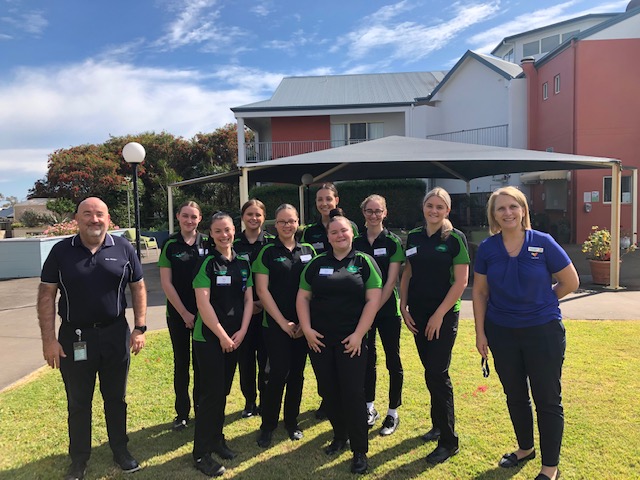Vacenti
- Outside-in
- Health Sector
- South East Queensland

The Challenge
Vacenti is a quality aged care and senior living provider based in South-East Queensland for more than 40 years. We are a family-owned company with six homes, caring for over 550 residents; our family values are at the core of our business.
The Aged Care sector faces many workforce challenges in the attraction, training, and retention of staff often reliant upon recent graduates of government funded training programs. The sourcing and onboarding of staff is often a continuous process faced with quality and retention issues.
These workforce challenges, left unaddressed, have the capacity to negatively impact on the level of service and continuity of care for Vacenti residents and overall workforce stability, increasing recruitment and onboarding costs from a human resources perspective.
The Solution
To address these challenges, Vacenti decided to introduce an alternate source of labor into the organisation to complement existing recruitment and retention strategies.
Vacenti identified that over 2000 senior high school students in the region have elected a health career pathway by enrolling in and completing the Certificate II in Health Support Services as part of their senior schooling studies. Through conducting this research, Vacenti became aware of the success of this type of Grow Your Own Workforce program and were keen to engage and attract a younger workforce through the introduction of a School Based Traineeship program.
In 2020 Vacenti implemented it’s first school-based traineeship ‘pilot’ program with an intake of fourteen (14) year 11 students from nine (9) local schools who will complete 375 hours paid employment in our facilities whilst undertaking their Certificate III in Individual Support.
It is Vacenti’s intention to transition its school-based trainees into the organisation’s AIN workforce upon successful completion of their traineeships whilst supporting them along their individual nursing career pathways (EN, EEN, RN).
Implementation
Vacenti Human Resource and Executive Management teams consulted with Facility Management teams to assess organisational buy-in and support for the implementation of a school-based traineeship program from a workforce strategy perspective.
Following a cost analysis, a budget was negotiated, and strategic partners were engaged. Vacenti engaged the services of a Group Training Organisation (GTO) that specialised in school-based health traineeship programs. It was determined that engaging a GTO provides a level of external support and management of the trainees as well access to catchment schools to provide recruitment and shortlisting.
Vacenti and GTO then engaged a Supervising Registered Training Organisation (SRTO) to deliver the Certificate III in Individual Support and, together, a traineeship delivery plan was developed.
The GTO engaged the schools through an Expression of Interest (EOI) process and managed the initial application process before shortlisting the most suitable applicants to attend Vacenti’s corporate ‘Assessment Centre’, the organisation’s standard recruitment and onboarding process. The Assessment Centre sessions were an encouraging success with the school students setting a very high standard and impressing our facility management and HR team with their enthusiasm and commitment.
Once the successful candidates were selected, the GTO arranged an information and onboarding session, completed the traineeship sign-up paperwork and facilitated the onboarding process including the provision immunisation evidence, national police check for all students.
Organisational strategies
- To ensure we have a diverse workforce (in terms of age, experience, background, culture) supported by multiple recruitment streams to deliver quality care and services to residents.
- Developing a grow your own workforce approach for in demand entry level roles (an outside-in approach).
- Engaging with youth in the local community to promote healthcare as a career choice.
Partnership strategies
- SRTO: Mater Education deliver the Certificate III in Individual Support.
- GTO: OSMAC Apprenticeships is the legal employer and provide valuable connection to schools as well as management, mentoring and support of the trainees whilst being a communication conduit between all parties.
- Vacenti is the ‘host’ employer and, using a GTO, are insulated from supported by the GTO when faced with external factors that may impact a school-based trainee. As a host we can focus on the development of our trainees without the hassle of addressing external issues.
- Connection with local catchment schools is vital along with identifying students already enrolled in certificate II health/community studies.
- Engagement of parents play a vital role in the additional support of students along the traineeship journey.
Program design strategies
- Partnering with providers already experienced in these areas and with a proven record of success.
- Ensure high level buy in from Vacenti Management.
- Ensuring the school-based traineeship is undertaken for the ‘right reasons’.
- Utilising a robust recruitment process to select the most suitable applicants.
- Ensuring wraparound support for students is in place to generate high completion rates and quality outcomes for both student and Vacenti.
Results
- Pilot program commenced in September 2020 with 14 school-based trainees across two Vacenti locations working one day per week during school terms and up to 30 hours per week in holidays
- Trainees will carry out 375 clinical hours paid workplace employment and complete their Certificate III in Individual Support over a 10-12 month period.
- Completion forecast – transition trainees to the AIN workforce immediately upon completion bolstering our workforce with internally trained staff.
Lessons Learned
- Collaboration – with strategic partners is a crucial foundation for program success
- Buy-in from management essential
- Need for high caliber of students (which we have)
- Manage staff expectations early and set a clear scope of work for trainees.
- Ensure regular debrief sessions are in place for trainees.
- Ensure forums are in place so trainees can share their stories with internal and external parties.
- Work towards guaranteed pathways for career/study progression, eg traineeship > further study > employment.
REQUIREMENTS FOR
REPLICATION
Do you…
- have internal and external partners that have a thorough understanding of the program’s objectives and who support the intended outcomes of the program?
- have identified entry pathways and entry level roles that you consistently recruit for or are in demand?
- have workforce plans in place to identify future roles and skills, as well as emerging roles?
- have a planned approach to the recruitment, onboarding and training of your trainees?
- have an approved budget to fund the program for 12 months or beyond?
Can you…
- adequately support the program management internally?
- sustain appropriate levels of financial and holistic support mechanism for your participating trainees?
- clearly articulate the non-clinical and clinical career pathways on offer to school students so they can make informed choices?
- offer trainees the opportunity to secure gainful employment or alternative options to advance their career opportunities?
CONSIDERATIONS FOR PROGRAM SCALING
Do you have…
- Internal resources that can be dedicated to supporting and monitoring the program and the trainees?
- Clearly defined roles and responsibilities of all program key stakeholders?
- A communications plan that promotes and highlights the benefits and success of your program?
- Defined key program milestones and an agreed reporting mechanism on the program’s progress?
- Commitment from your participating business areas to support and encourage the development of the trainees in the workplace, and to provide them with opportunities to align their study with practical work-related tasks and activities?
POTENTIAL RISKS
What if…
- The program is not funded to run again, do you have a mitigation strategy in place to continue to develop your grow your own initiative?
- Some of your trainees choose to drop out during the program, will you replace them? If so how?
- The individuals driving the program leave the organisation? Do you have continuity of the model based on process rather than people?
- Coordinators, support staff and trainers lack knowledge and expertise to meet the needs of the student cohort?
- Students don’t fit with the organisation’s values and culture?
- There is an oversupply of students and insufficient placements?
